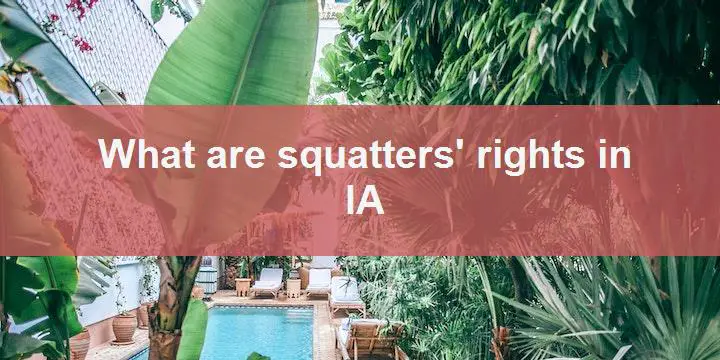What are squatters’ rights in Montana?
Firstly, it’s important to understand what squatters’ rights are. This refers to the legal term for a person who occupies land or property without the owner’s permission. In Montana, squatters’ rights exist and are protected under the law. Additionally, it’s important to note that these rights are not an automatic entitlement, as there are specific conditions that need to be met. Specifically, a squatter must openly and continuously occupy the land or property for a certain period of time, and must not have been evicted or otherwise forced to leave during that time. Finally, it’s worth noting that while squatters’ rights can offer some protections, it is always best to pursue legal ownership or rental agreements to avoid any potential legal disputes down the line.
What is the squatting/squatter?
The squatting/squatter is a complex issue that has been debated for years. Firstly, it is important to define what is meant by squatting/squatter. In essence, it refers to the act of living in a property without the owner’s permission. Squatting can occur in both residential and commercial properties. Unfortunately, this can sometimes lead to disputes between the property owner and the squatter. For example, in London, a group of squatters took over a disused courthouse and turned it into a community centre. Although they argue that they are using an abandoned building, the owner still wants them gone. This example highlights the complicated nature of the squatting/squatter issue.
What is Adverse posession in Montana?
Adverse possession in Montana is a legal concept that allows someone to claim ownership of a property if they have been using it without the owner’s permission for a certain period of time. To be successful, the person must prove that they have been using the property openly, notoriously, exclusively, and continuously for a minimum of five years. Furthermore, the person must also show that they have been paying taxes on the property during that time. Adverse possession can be a complex legal issue, and it is important to consult with a knowledgeable attorney to understand your rights and responsibilities.
Is it legalto squat in Montana?
Firstly, it is important to understand that squatting refers to occupying an abandoned or unoccupied property without the owner’s permission. In Montana, this act is illegal and can lead to serious legal consequences. Despite this, some individuals may attempt to squat in abandoned or unoccupied properties, often leading to disputes with the property owners or law enforcement officials. Therefore, it is important to follow the legal process of obtaining a property and not resort to illegal activities such as squatting. Ultimately, while there may be cases of individuals getting away with squatting in Montana, it is not a recommended or lawful course of action.
Can police remove squatters in Montana?
Montana has its own laws and regulations when it comes to dealing with squatters. So, can police remove squatters in Montana? Yes, they can, but only under certain circumstances. Firstly, the police can remove squatters if they have a court order that authorizes them to do so. Secondly, if the squatters pose a threat to public safety, the police can remove them without a court order. Additionally, if the property owner requests the removal of the squatters, the police can intervene. However, in some cases, the police may require the assistance of a civil court to address the issue of squatters. In conclusion, although the police can remove squatters in Montana, it is important to follow the proper legal procedures when addressing this situation.
How to evict squatter in Montana?
If you’re a landlord who owns a property in Montana and has a squatter, it can be a difficult situation to deal with. However, there are steps you can take to evict the squatter legally. First and foremost, it’s important to issue the squatter with a formal notice to vacate. Then, if they refuse to leave, you will need to file an eviction lawsuit. This involves attending a hearing and presenting evidence to show that the squatter is unlawfully occupying the property. If the court rules in your favor, you will be granted a writ of possession, which authorizes law enforcement to remove the squatter by force if necessary. Although the eviction process may be time-consuming and stressful, it’s essential for protecting your property rights as a landlord.
FAQ
Q: What are squatters’ rights in Montana?
A: Squatters’ rights are not legally recognized in Montana.
Q: What is considered squatting in Montana?
A: Squatting means occupying someone else’s land or property without permission or legal right to live there.
Q: Are there any exceptions to squatters’ rights in Montana?
A: No, there are no exceptions to squatters’ rights in Montana as they are not legally recognized.
Q: Can squatters be evicted in Montana?
A: Yes, squatters can be evicted through legal means and the property owner may file an eviction lawsuit.
Q: How long do squatters have to be on a property for it to be considered their own?
A: In Montana, there is no time frame for squatters to gain legal ownership of a property.
Q: Can squatters claim adverse possession in Montana?
A: No, Montana does not recognize adverse possession claims made by squatters.
Q: Do squatters have any legal rights in Montana?
A: Squatters have no legal rights in Montana as they are not recognized under state law.
Q: Can a property owner sue a squatter for damages?
A: Yes, a property owner can sue a squatter for any damages caused to the property or for any expenses incurred during the eviction process.
Q: Can a property owner use force to remove a squatter?
A: No, property owners cannot use force to remove squatters as it is illegal. The eviction process should be followed through legal means.
Q: What is the eviction process for squatters?
A: The property owner must give the squatter a written notice to leave the property. If the squatter does not leave within the specified time, the property owner may file a lawsuit for eviction.
Also Reading
Top neighborhoods in St. Louis for families
Better know before moving to Montana
What is the eviction process in Vermont?




